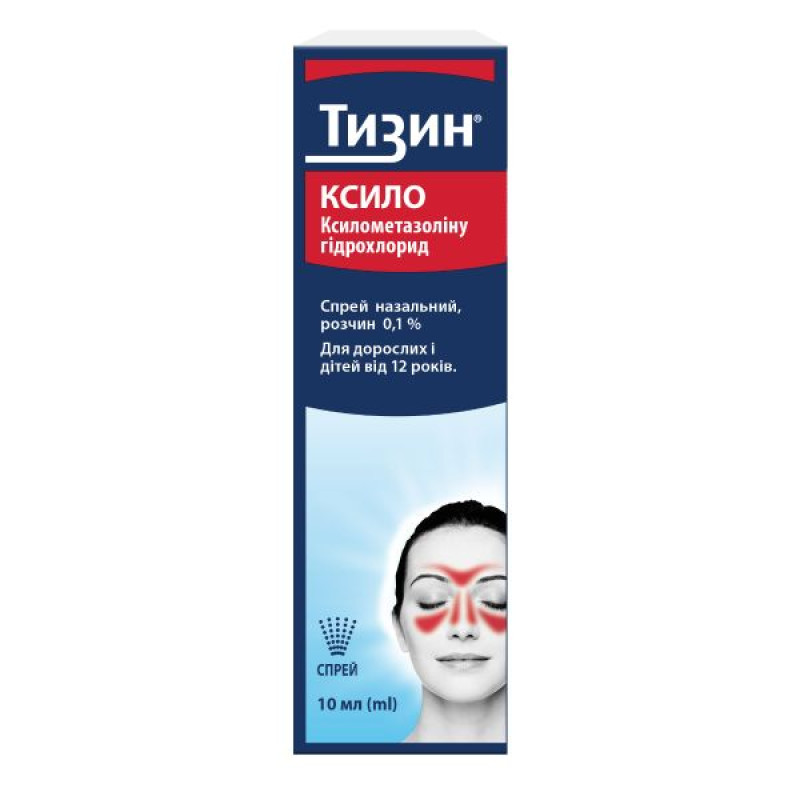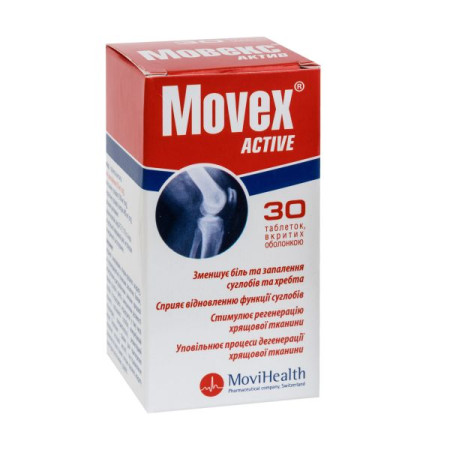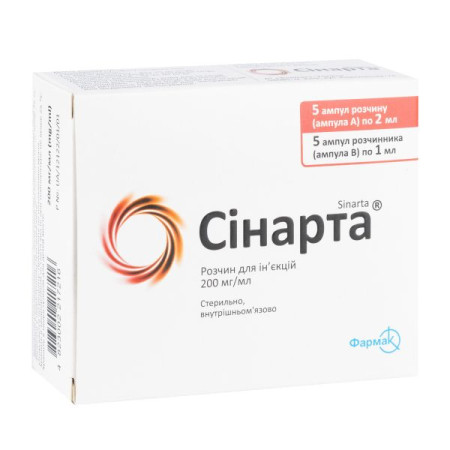Tizin xylo spray nasal solution 0.1% bottle 10 ml

Instructions for use: Tizin xylo spray nasal solution 0.1%, bottle 10 ml
Composition
active ingredient: xylometazoline hydrochloride;
1 ml of solution contains 0.5 mg or 1 mg of xylometazoline hydrochloride;
Excipients: benzalkonium chloride solution; sorbitol non-crystallizing solution
(E 420); sodium chloride; sodium dihydrogen phosphate, dihydrate; sodium hydrogen phosphate, dihydrate; disodium edetate; purified water.
Dosage form
Nasal spray, solution.
Main physicochemical properties: transparent colorless solution, odorless or with a slight characteristic odor.
Pharmacotherapeutic group
Anti-edematous and other drugs for topical use in diseases of the nasal cavity. Sympathomimetics, simple drugs.
ATX code R01A A07.
Pharmacological properties
Xylometazoline hydrochloride, an imidazole derivative, is a sympathomimetic active ingredient with alpha-adrenergic activity. The drug has a vasoconstrictor effect, thereby reducing swelling of the mucous membrane. The onset of action is usually observed after 5-10 minutes and lasts up to 10 hours; the drug facilitates nasal breathing, reducing swelling of the mucous membrane and improving secretion removal.
When applied nasally, the absorbed amount of the drug may sometimes be sufficient to cause systemic effects, including manifestations on the central nervous system and cardiovascular system.
Indication
For the symptomatic relief of nasal congestion in acute rhinitis associated with colds and flu, sinusitis, allergic and non-allergic rhinitis.
Contraindication
Tizin® Xylo should not be used in the following cases:
hypersensitivity to the active substance xylometazoline hydrochloride or to any of the excipients of the drug;
dry inflammation of the nasal mucosa with crust formation (dry rhinitis);
atrophic or vasomotor rhinitis;
simultaneous treatment with monoamine oxidase inhibitors (MAOIs), treatment with monoamine oxidase inhibitors (MAOIs) within two weeks before starting the use of Tizin® Xylo nasal spray, or other drugs that can increase blood pressure;
after hypophysectomy or surgery on the dura mater;
closed-angle glaucoma;
acute coronary diseases;
coronary asthma;
hyperthyroidism.
Due to the content of benzalkonium chloride, which is used as a preservative, Tyzin® Xylo should not be used in case of established hypersensitivity to this compound.
Special safety precautions
With topical application of xylometazoline hydrochloride, systemic absorption is minimal, however, Tizin® Xylo should be used only after a careful benefit-risk assessment in patients:
with severe cardiovascular diseases (e.g. ischemic heart disease, arterial hypertension);
with pheochromocytoma;
with metabolic disorders (for example, in the case of diabetes);
with prostatic hyperplasia.
Long-term use and overdose of sympathomimetic decongestants can lead to reactive hyperemia of the nasal mucosa. This reaction can cause airway obstruction, which in turn requires repeated or even continuous use of the drug. This can lead to chronic edema (rhinitis medicamentosa) and ultimately to atrophy of the nasal mucosa and ozena.
In milder cases, you can stop using sympathomimetic drugs first in one nostril, and after the complications have subsided, continue treatment by using the drug in the other nostril to maintain nasal breathing at least half.
Tyzin® Xylo contains benzalkonium chloride. This compound may cause irritation of the nasal mucosa.
Interaction with other medicinal products and other types of interactions
Concomitant use of Tizin® Xylo spray with monoamine oxidase inhibitors of the tranylcypromine type or tricyclic antidepressants, as well as drugs that increase blood pressure, may lead to arterial hypertension due to the effect of these drugs on the cardiovascular system.
Due to the low systemic absorption of xylometazoline when administered intranasally, interactions with drugs administered by other routes are considered unlikely.
Application features
The drug should be prescribed with caution to patients who experience severe adverse reactions such as insomnia, dizziness, tremor, cardiac arrhythmia, and increased blood pressure when using adrenergic drugs.
Use during pregnancy or breastfeeding
Pregnancy
Xylometazoline hydrochloride should not be used during pregnancy, as there are no adequate studies of the drug's effects on the fetus.
Breast-feeding
The drug Tyzin® Xylo should not be used during breastfeeding, as it is not known whether the active substance penetrates into breast milk.
Ability to influence reaction speed when driving vehicles or other mechanisms
Usually, Tyzin® Xylo does not affect the ability to drive vehicles and complex mechanisms when used in recommended doses, but the possibility of adverse reactions from the central nervous system and organs of vision should be taken into account.
Method of administration and doses
Doses
The dose depends on the individual sensitivity of the patient and the clinical effect.
Unless otherwise prescribed, children aged 4 to 6 years are prescribed 1-2 injections of the drug Tizin® Xylo (0.05% metered spray) into each nostril up to 3 times a day, children aged 6 to 12 years are prescribed 2-3 injections of the drug Tizin® Xylo (0.05% metered spray) into each nostril up to 3 times a day. Adults and children aged 12 years and older are prescribed 2-3 injections of the drug Tizin® Xylo (0.1% metered spray) into each nostril up to 3 times a day.
Method of application
To use the drug Tizin® Xylo, nasal spray, solution 0.05% and 0.1%, you should first remove the protective cap. Before the first use, you should press the dispenser several times until a homogeneous spray appears. The spray is ready for further use. The tip of the cap should be inserted into each nostril and pressed once. During spraying, you should inhale slightly through your nose.
Hold the bottle of nasal spray, solution 0.05% and 0.1% upright. Do not spray from top to bottom or at an angle. For hygiene reasons, wipe the sprayer after each use and put on the protective cap.
Duration of treatment
Tyzin® Xylo should not be used for longer than 7 consecutive days, unless recommended by a doctor.
Repeated use should be started only after a break of several days and after consultation with a doctor. The duration of treatment for children is determined by the doctor individually.
In case of chronic rhinitis, the drug Tizin® Xylo can only be used under the supervision of a doctor due to the risk of atrophy of the nasal mucosa.
Children.
Tizin® Xylo, nasal spray, 0.05% solution is intended for the treatment of children aged 4 to 12 years. It is not recommended to prescribe Tizin® Xylo, nasal spray, 0.05% solution for the treatment of children under 4 years of age.
Tizin® Xylo, nasal spray, 0.1% solution is intended for the treatment of adults and children aged 12 and over.
Overdose
Symptoms
With nasal administration, systemic effects are unlikely due to local vasoconstriction, which inhibits absorption. In the case of systemic absorption, xylometazoline, as an α2-adrenergic agonist, can be expected to have effects similar to clonidine: a short-term increase in blood pressure followed by more prolonged hypotension and sedation.
Symptoms of intoxication with imidazole derivatives may be clinically unclear, as periods of stimulation may alternate with periods of depression of the central nervous and cardiovascular systems.
Symptoms of central nervous system stimulation include anxiety, agitation, hallucinations, and seizures.
Symptoms of central nervous system depression include decreased body temperature, lethargy, drowsiness, and coma.
Additional symptoms may include: miosis, mydriasis, sweating, nausea, cyanosis, fever, pale skin, CNS paralysis, sedation, dry mouth, arrhythmia, tachycardia, bradycardia, cardiac arrest, hypertension, shock-like hypotension, pulmonary edema, respiratory distress, and apnea.
Overdose, especially in children, can lead to significant effects on the central nervous system, causing convulsions, coma, bradycardia, apnea, and hypertension, which may progress to hypotension.
Treatment
Severe overdose will require hospital treatment. Since xylometazoline hydrochloride is rapidly absorbed, activated charcoal (absorbent), sodium sulfate (laxative) or gastric lavage (when using higher doses) should be administered immediately. Lowering blood pressure can be achieved with non-selective alpha-blockers. Vasoconstrictors are contraindicated. If necessary, antipyretics and anticonvulsants, as well as artificial oxygen respiration, are used.
Adverse reactions
Adverse events were classified according to the following frequency categories:
very common: >1/10;
common: >1/100 to <1/10;
uncommon: >1/1000 to <1/100;
rare: >1/10,000 to <1/1,000;
very rare: <1/10,000;
frequency unknown: frequency cannot be estimated from the available data.
Respiratory, thoracic and mediastinal disorders:
Tyzin® Xylo may cause temporary mild signs of irritation (burning sensation or dryness of the nasal mucosa), especially in sensitive patients, and pain in the nose and throat.
Common: reactive hyperemia.
Uncommon: nosebleed, sneezing, epistaxis.
Prolonged or frequent use of higher doses of xylometazoline hydrochloride may cause a burning sensation, tingling, itching, sensitivity, dryness or irritation of the nasal mucosa, as well as reactive congestion and rhinitis medicamentosa. This effect may occur after as little as 7 days of treatment and after prolonged use may lead to irreversible damage to the nasal mucosa with crusting (rhinitis sicca).
Sometimes nausea, headache and temporary visual impairment may occur.
Recurrent nasal congestion has been reported after discontinuation of treatment, particularly with prolonged use of xylometazoline.
Rare: headache, dizziness, rebound effect, insomnia, increased fatigue.
Very rare: hallucinations, mainly in children.
Cardiovascular system disorders:
Uncommon: systemic effects of sympathomimetics (rapid heartbeat, increased pulse, increased blood pressure).
Very rare: arrhythmia.
Musculoskeletal and connective tissue disorders:
Very rare: convulsions, especially in children.
Immune system disorders
Uncommon: hypersensitivity reactions, including angioedema, rash, pruritus.
Post-marketing data
The following side effects were observed and were spontaneously reported: burning sensation of the mucous membrane, dry nose, prolonged treatment may lead to a rebound effect.
Expiration date
3 years.
The shelf life of the drug after opening the bottle is 24 weeks.
Storage conditions
Store at a temperature not exceeding 25 °C, out of the reach of children. Do not freeze.
Packaging
Nasal spray, 0.05% and 0.1% solution, 10 ml in bottles; 1 bottle in a cardboard box.
Vacation category
Without a prescription.
Producer
DELPHARM ORLEANS/ DELPHARM ORLEANS.
Location of the manufacturer and address of its place of business
5 avenue de Concyr, ORLEANS CEDEX 2, 45071, France/5 avenue de Concyr, ORLEANS CEDEX 2, 45071, France.
Applicant
McNeil Products Limited.
Applicant's location
50-100 Holmers Farm Way, High Wycombe, HP12 4EG, England.
Applicant's representative
Johnson & Johnson Ukraine LLC.
Location of the applicant's representative
Ukraine, 01010, Kyiv, Moskovska St., 32/2.
+38 (044) 498 0888
+38 (044) 498 7392
There are no reviews for this product.
There are no reviews for this product, be the first to leave your review.
No questions about this product, be the first and ask your question.















